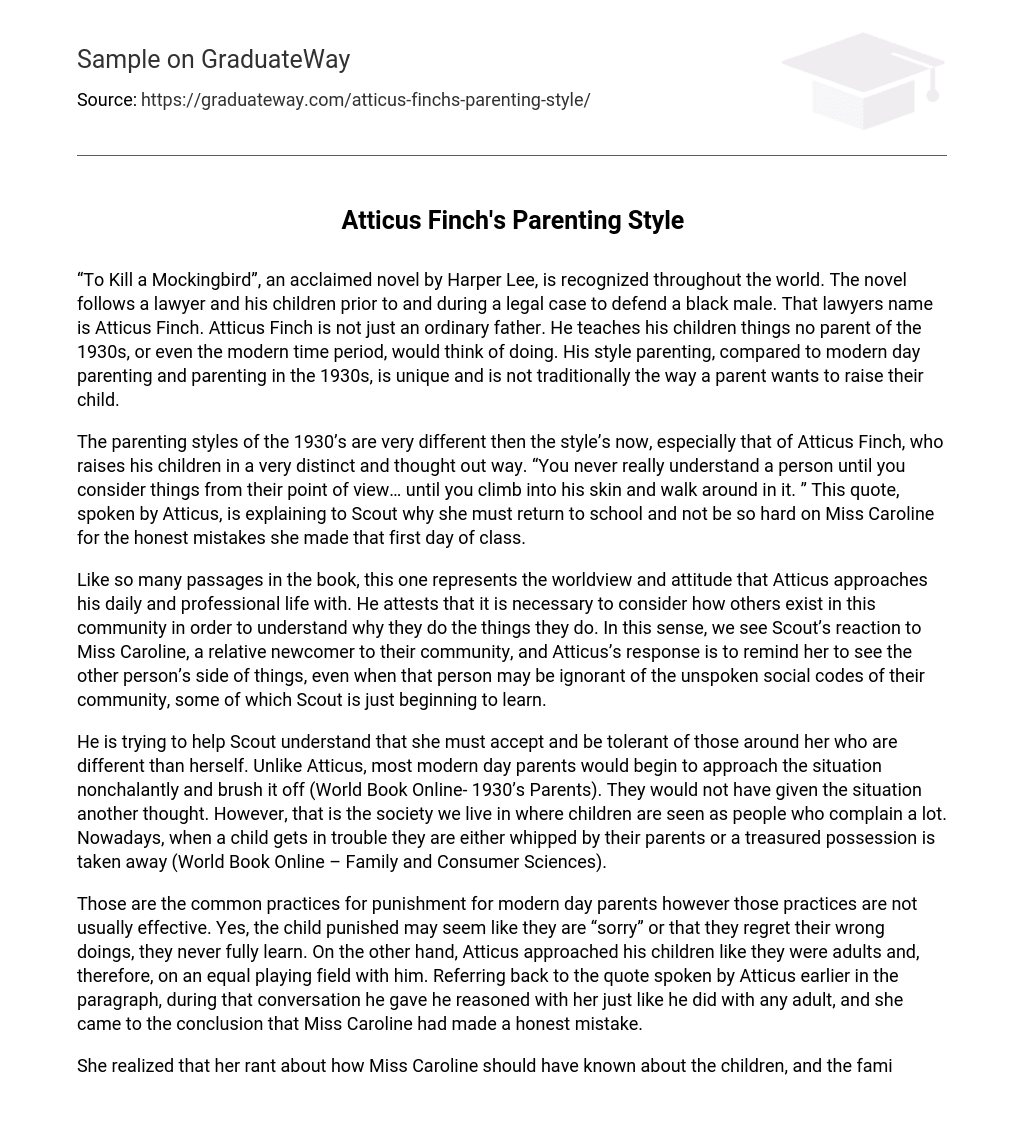“To Kill a Mockingbird”, a globally recognized novel by Harper Lee, depicts the story of a lawyer named Atticus Finch and his children during a legal case involving the defense of a black man. Unlike typical fathers of the 1930s or contemporary times, Atticus Finch stands out for his unconventional parenting methods. He imparts valuable life lessons to his children, which sets him apart from traditional approaches to raising children.”
In the 1930’s, parenting styles differed greatly from those of today. Atticus Finch, however, stands out with his unique and deliberate approach in raising his children. Atticus shares a piece of wisdom with Scout, stating, “You never really understand a person until you consider things from their point of view… until you climb into his skin and walk around in it.” He explains to Scout the importance of returning to school and being understanding towards Miss Caroline for the honest mistakes she made on the first day of class.
Like many other passages in the book, this one showcases Atticus’s worldview and attitude towards his everyday life and professional work. He emphasizes the importance of understanding how others live in their community to comprehend their actions. This becomes evident when Scout reacts to Miss Caroline, a newcomer to their community. Atticus advises her to consider the other person’s perspective, even if they are unaware of the unwritten social rules in their community – rules that Scout is just starting to grasp.
The text emphasizes the importance of encouraging Scout to accept and tolerate people who are different from her. In contrast to Atticus, today’s parents tend to dismiss such situations nonchalantly (World Book Online- 1930’s Parents). This reflects society’s perception of children as frequent complainers. Nowadays, when children misbehave, they are either physically disciplined or have a cherished item confiscated by their parents (World Book Online – Family and Consumer Sciences).
These are the typical punishment methods used by contemporary parents, but they are often ineffective. While a punished child may appear remorseful or regretful, true understanding is not achieved. In contrast, Atticus treated his children as equals, engaging with them on an adult level. Following his earlier statement, he used reasoning to discuss the situation, similar to how he would with any adult. As a result, his daughter concluded that Miss Caroline had made an honest mistake.
Realizing that her criticism of Miss Caroline’s lack of knowledge about the community’s children and families was unjustified and incorrect, she acknowledged Atticus Finch’s distinct and thoughtful approach in educating his own children. Despite living in the 1930s setting of “To Kill A Mockingbird,” it would be mistaken to assume that Atticus adhered to conventional parenting methods prevalent during that era. Instead, he imparted numerous invaluable life lessons to Scout and Jem.
In the 1930s, a crucial lesson on equality was learned. Racism was prevalent in the southern states, including Maycomb county. Nevertheless, Atticus distinguished himself as one of the rare individuals who did not harbor racist beliefs. He desired for his children to stand apart from the rest of Maycomb and be unaffected by the prevailing racism. Atticus conveyed to his children, “You
“As you grow older you’ll see white men cheat black men every day of your life, but let me tell you something and don’t you forget it- whenever a white man does that to a black man, no matter who he is, how rich he is, or how fine a family he comes from, that white man is trash.”
In the 1930’s, Atticus had conflicting opinions on child-rearing and the teachings about racism compared to other parents. While being an exemplary father himself, typical white parents during this time would instill the belief that not all individuals are equal.
Teaching their children that a white man is superior to a black man in every way, claiming kindness and honesty as inherent traits of the former. The character Bob Ewell exemplifies this racism by manipulating his daughter into accusing innocent Tom Robinson of rape and assault. Mr. Ewell instilled in his daughter the belief that false accusations based on African-American heritage were acceptable. Atticus, however, held a completely contrasting perspective.
Atticus used his influential power over his children to teach them the difference between right and wrong. He would have encouraged them to be truthful rather than falsely accusing an innocent man. In the event of the alleged rape case, many parental figures would have supported Bob Ewell out of sympathy. The differing opinions on racism and equality in the 1930s is what sets Atticus Finch apart from others. His parenting skills demonstrate what an exceptional father he is.
In the 1930’s, Atticus stood out as a parent who raised his children in a unique way, distinct from other parents of that time. His parenting style still remains different from contemporary parents. Atticus stimulated his children intellectually and educated them on the importance of equality. This conflict demonstrates that parents’ approaches in preparing their children for the world are influenced by their culture, the era they live in, and their individual viewpoints.





